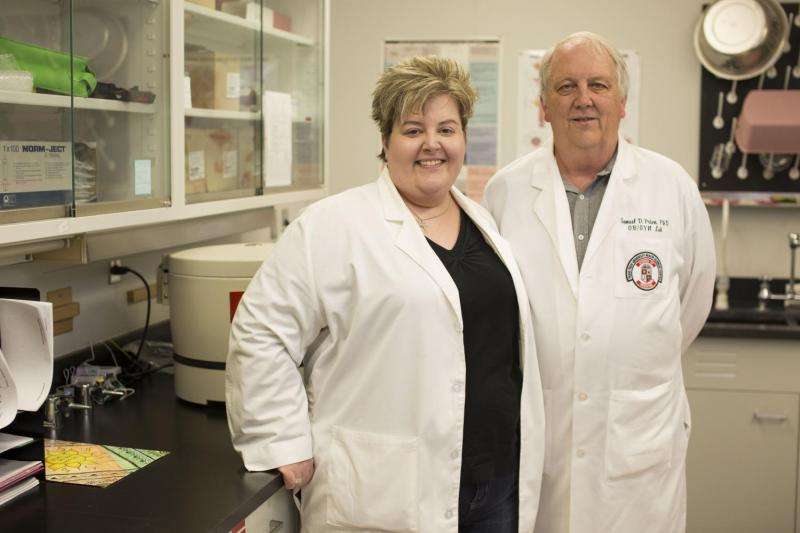TTUHSC Researchers Dr. Lindsay Penrose and Dr. Sam Prien developed technology to determine male sex selection. Credit: TTUHSC
Texas Tech University Health Sciences Center (TTUHSC) researchers have developed a low cost technology related to sex select semen that can be used with artificial insemination in animals.
Samuel Prien, Ph.D., and Lindsay Penrose, Ph.D., both with the TTUHSC Department of Ob/Gyn, completed their research, "A Prepatory Technique for Semen Selection." By developing a method to chemically attract the sperm to what is a favorable environment, the research found conception of a male could be as high as 72 percent.
"We provide sperm with numerous environmental choices at the same time," Prien said. "By providing a chemical trail for the cell to follow, it can biochemically select its preferred environment. The technology uses simple chemical properties to affect sperm movement allowing separation of X and Y type sperm for insemination in animals."
Cytometric sorting, the current available, yet expensive, technology can be used to separate sperm based on sex chromosome content. Penrose said by using chemotaxis, the researchers targeted the cells by allowing the sperm to follow a chemical trail. During chemotaxis, cells move in response to chemical signals.
"The course of our research allowed us to select for males first," Penrose said. "But with modification, selection for females is possible as well. We found that the cell would pick the preferred chemical pathway and follow it. Over the years, a tremendous amount of resources have been spent on searching for techniques that are practical in a wide variety of settings. Flow cytometry is one, but, it is extremely costly, and there are concerns over the safety of the procedure."
The technology has received a patent from the U.S. Patent and Trademark Office for "Method and Apparatus for Gender Selection." The patent rights have been licensed to Reproductive Solutions Inc. SureBreed is a trademark registered to Reproductive Solutions for the commercial product they have developed that uses the patented technology.
Prien said sex selection could dramatically increase the profitability of dairies and beef cattle feeder operations by producing a higher percentage of male or female animals as desired.
"Spending for flow cytometric sorting is estimated at $140 million per year," Prien said. "This low cost sexing will make sex selection available on a much wider scale with a much larger market potential."
Provided by Texas Tech University Health Sciences Center






















